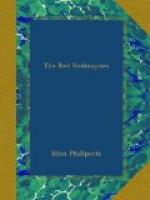“I think it right to tell you,” he said, “that my wife and I never cared much for this engagement. Redmayne meant well and had a good heart I believe. He was free-handed and exceedingly enamoured of Flora. He made violent love from the first and his affection was returned. But I never could see him a steady, married man. He was a rover and the war had made him—not exactly inhuman, but apparently unconscious of his own obligations to society and his own duty, as a reasonable being, to help build up the broken organization of social life. He only lived for pleasure and sport or spending money; and though I do not suggest he would have been a bad husband, I did not see the makings of a stable home in his ideas of the future. He had inherited some forty thousand pounds, but he was very ignorant of the value of money and he showed no particular good sense on the subject of his coming responsibilities.”
Mark Brendon thanked them for their information and repeated his growing conviction that the subject of their speech had probably committed suicide.
“Every hour which fails to account for him increases my fear,” he said. “Indeed it may be a good thing to happen; for the alternative can at best be Broadmoor; and it is a hateful thought that a man who has fought for his country, and fought well, should end his days in a criminal lunatic asylum.”
For two days the detective remained at Paignton and devoted all his energy, invention, and experience to the task of discovering the vanished men. But, neither alive nor dead, did either appear, and not a particle of information came from Princetown or elsewhere. Portraits of Robert Redmayne were printed and soon hung on the notice board of every police station in the west and south; but one or two mistaken arrests alone resulted from this publicity. A tramp with a big red mustache was detained in North Devon and a recruit arrested at Devonport. This man resembled the photograph and had joined a line regiment twenty-four hours after the disappearance of Redmayne. Both, however, could give a full account of themselves.
Then Brendon prepared to return to Princetown. He wrote his intention to Mrs. Pendean and informed her that he would visit Station Cottages on the following evening. It happened, however, that his letter crossed another and his plans were altered, for Jenny Pendean had already left Princetown and joined Mr. Bendigo Redmayne at his house, “Crow’s Nest,” beyond Dartmouth. She wrote:
“My uncle has begged me to come and I was thankful to do so. I have to tell you that Uncle Bendigo received a letter yesterday from his brother, Robert. I begged him to let me send it to you instantly, but he declines. Uncle Bendigo is on Captain Redmayne’s side I can see. He would not, I am sure, do anything to interfere with the law, but he is convinced that we do not know all there is to be told about this terrible thing. The motor boat from ‘Crow’s Nest’ will be at Kingswear Ferry to meet the train reaching there at two o’clock to-morrow and I hope you may still be at Paignton and able to come here for a few hours.”
She added a word of thanks to him and a regret that his holiday was being spoiled by her tragedy.




